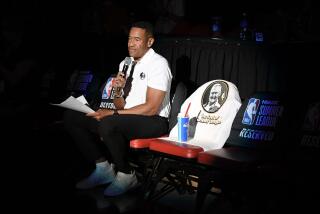Knight Had a Good Reason, Bad Form on His Chair Toss
- Share via
We’re all aware by now that Indiana basketball Coach Bobby Knight made a serious mistake in throwing that chair across the court last Saturday to protest the officiating.
His form was terrible. And this is a coach who puts so much stress on fundamentals.
He threw the chair sidearm, skidding it across the court.
Wrong, wrong, wrong.
As any professional wrestler could explain, sidearm chair-throwing is for pencil-necks. The overhand delivery is far superior, creating greater impact.
Knight just lost his head. Wrestlers, a more cerebral lot than basketball coaches, climb to the top of the ring ropes before hurling chairs or other wrestlers into the audience. Knight should have jumped up on the nearby scorekeeper’s table and dashed the chair to the floor.
Instead, he hurried his throw. After studying the game films and noting his sloppy technique, Knight announced that he was deeply sorry.
He also seemed apologetic about his behavior, but he quickly explained why he blew up.
“I’ve been upset with the officiating all year long,” Knight said.
Well, then. No wonder he threw that chair. Somebody’s got to bring to public attention the scandalous way basketball referees always seem to pick on the losing team.
Still, the tantrum stuff has got to stop. Somebody could get hurt. Knight could have pulled a muscle.
Knight’s sideline behavior is hardly representative of all coaches, but basically they all act like jerks. It is a problem. Here’s the solution:
Put the coach in an isolation booth at the top of the arena. Give him a phone to relay strategy and advice to an assistant coach on the bench.
Actually it’s not my idea. It belongs to Chuck DeBus, coach of the Los Angeles Track Club, and a student of sports psychology in general.
“The coach’s job shouldn’t be to yell at the referees and players, it should be to make decisions,” DeBus reasons. “If you remove yourself from the noise and pressure of being on the sidelines, you have a better chance to make calm, rational decisions.
“I’d put myself in a soundproof booth, like the ones they used on the old TV show, ‘The $64,000 Question.’ ”
Knight would be an ideal subject to be sent into upper space in this coaching capsule.
He would have a nice view of the court from up there, the better to spot trends and map strategy.
And with the phone hookup to the bench, the human touch would not be lost. Knight could phone his assistant with instructions like, “Take Bobby Jim out of the game and kick him real hard in the seat of the pants.”
For Knight’s own protection, the cell would be padded. To keep out distractions, it would be padlocked.
Knight could still throw tantrums, but soon he’d get tired of yelling and jumping around because nobody would notice him. There would be nothing left for him to do but coach basketball.
I think DeBus’ idea has some merits, but also some serious drawbacks.
With the coaches stuck up in the rafters, the fans would have nothing to watch but a basketball game. This can get very boring, especially at the college level.
Also, if the coaches were not on the sidelines, we would have no way to judge their coaching ability, other than by how their teams played.
As all sports fans know, the true measure of coaching greatness is how much a coach can get away with before he is fired or indicted on criminal charges.
No, we can’t isolate the coaches. If they weren’t on the sidelines, who would keep the officials in line?
With nobody to intimidate the zebras, to yell and scream at them, they would become power-crazed. They would call a foul every time a player broke another player’s arm, or drew blood. The natural pace of the game would be upset.
Besides, basketball needs checks and balances. Referees probably won’t admit it, but they appreciate it when the coach hurls a chair or clipboard onto the court. It reminds the referee that he’s unintentionally favoring the other team.
The coach belongs on the sidelines. If his actions incite criminal crowd behavior and result in bodily harm to referees and embarrassment to the school, that’s a small price to pay for the leadership and inspiration the coach provides.
The coaching capsule is an interesting idea, but there are less extreme ways of modifying behavior.
In the case of a guy like Knight, for instance, I think a simple name change would do the trick.
If you call a coach Bobby, or Billy or Chuckie or Woody, how can you expect him to act like a grown-up? Why do you think Sparky Anderson and Jimmy Connors have such tough times controlling their tempers?
If everybody started calling Bobby Knight Robert, I think we’d see a difference in the man. We’d see a new maturity.
At the very least, we’d shame the guy into improving his disgraceful chair-tossing form.
More to Read
Go beyond the scoreboard
Get the latest on L.A.'s teams in the daily Sports Report newsletter.
You may occasionally receive promotional content from the Los Angeles Times.










